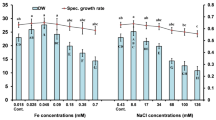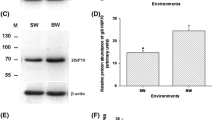Abstract
Salinity is one of the most important abiotic environmental factors for marine animals. If salinity deviates from optimum, adaptive mechanisms switch on to maintain organism’s physiological activity. In this study the proteome of the marine snails Littorina saxatilis from natural habitats (12, 23 and 32‰ and in response to experimental salinity decreasing (from 20‰ to 10‰) was analyzed. The isolation of all snails inside their shells and gradually declining mortality was observed under an acute experimental salinity decrease. Proteomic changes were evaluated in the survived experimental mollusks compared to control individuals using differential 2D gel-electrophoresis (DIGE) and subsequent LC-MS/MS-identification of proteins. Approximately 10% of analyzed proteins underwent upor down regulation during the experiment. Proteins of folding, antioxidant response, intercellular matrix, and metabolic enzymes were identified among them. Proteomic changes observed in experimental hypoosmotic stress partially reproduced in the proteomes of molluscs that live in conditions of natural freshening (estuaries). Possible mechanisms involved in the adaptation process of L. saxatilis individuals to hypoosmotic stress are discussed.
Similar content being viewed by others
References
Abe, H., Hirai, S., and Okada, S., Metabolic responses and arginine kinase expression under hypoxic stress of the kuruma prawn Marsupenaeus japonicas, Comparative Biochem. Physiol. A: Mol. Integrative, 2007, vol. 146, pp. 40–46.
Berger, V.Ya., Adaptatsiya morskikh mollyuskov k izmeneniyam solenosti sredy (Adaptations of Marine Mollusks to Changes of Environmental Salinity), Leningrad: Nauka, 1986.
Bussell, J.A., Gidman, E.A., Causton, D.R., GwynnJones, D., Malham, S.K., Jones, M.L.M., Reynolds, B., and Seed, R., Changes in the immune response and metabolic fingerprint of the mussel, Mytilus edulis (Linnaeus) in response to lowered salinity and physical stress, J. Exper. Marine Biol. Ecol., 2008, vol. 358, pp. 78–85.
Canbäck, B., André, C., Galindo, J., Johannesson, K., Johansson, T., Panova, M., Tunlid, A., and Butlin, R., The Littorina Sequence Database (LSD)—an online resource for genomic data, Mol. Ecol. Resources, 2012, vol. 12, pp. 142–148.
Cheng, W., Juang, F.M., and Chen, J.C., The immune response of Taiwan abalone Haliotis diversicolor supertexta and its susceptibility to Vibrio parahaemolyticus at different salinity levels, Fish Shellfish Immunol., 2004, vol. 16, pp. 295–306.
Davenport, J., The isolation response of mussels (Mytilus edulis L.) exposed to falling sea-water concentrations, J. Marine Biol. Assoc. UK, 1979, vol. 59, pp. 123–132.
De Zoysa, M., Whang, I., Lee, Y., Lee, S., Lee, J.S., and Lee, J., Transcriptional analysis of antioxidant and immune defense genes in disk abalone (Haliotis discus discus) during thermal, low-salinity and hypoxic stress, Compar. Biochem. Physiol. B: Biochem. Mol. Biol., 2009, vol. 154, pp. 387–395.
Diz, A.P., Truebano, M., and Skibinski, D.O., The consequences of sample pooling in proteomics: an empirical study, Electrophoresis, 2009, vol. 30, pp. 2967–2975.
Foster, B.A., Responses and acclimation to salinity in the adults of some balanomorph barnacles, Phil. Trans. Royal Soc. B: Biol. Sci., 1970, vol. 256, pp. 377–400.
Fretter, V. and Graham, A., British Prosobranch Molluscs, Their Functional Anatomy and Ecology. Revisited and updated edition, London: The Ray Soc., 1994.
Granovitch, A.I., Mikhailova, N.A., Znamenskaya, O., and Petrova, Yu.A., Species composition of mollusks of genus Littorina (Gastropoda, Prosobranchia) at East Murman, Zool. Zh., 2004, vol. 83, 11, pp. 1305–1316.
Hartl, F.U., Molecular chaperones in cellular protein folding, Nature, 1996, vol. 381, pp. 571–580.
Jiang, H., Li, F., Xie, Y., Huang, B., Zhang, J., Zhang, J., Zhang, C., Li, S., and Xiang, J., Comparative proteomic profiles of the hepatopancreas in Fenneropenaeus chinensis response to hypoxic stress, Proteomics, 2009, vol. 9, pp. 3353–3367.
Kamradt, M.C., Lu, M., Werner, M.E., Kwan, T., Chen, F., Strohecker, A., Oshita, S., Wilkinson, J.C., Yu, C., Oliver, P.G., Duckett, C.S., Buchsbaum, D.J., LoBuglio, A.F., Jordan, V.C., and Cryns, V.L., The small heat shock protein alpha B-crystallin is a novel inhibitor of TRAIL-induced apoptosis that suppresses the activation of caspase-3, J. Biol. Chem., 2005, vol. 280, pp. 11059–11066.
Kamradt, M.C., Lu, M., Werner, M.E., Kwan, T., Chen, F., Strohecker, A., Oshita, S., Wilkinson, J.C., Yu, C., Oliver, P.G., Duckett, C.S., Buchsbaum, D.J., LoBuglio, A.F., Jordan, V.C., and Cryns, V.L., The small heat shock protein alpha B-crystallin is a novel inhibitor of TRAIL-induced apoptosis that suppresses the activation of caspase-3, J. Biol. Chem., 2005, vol. 280, pp. 11059–11066.
Khlebovich, V.V., Aladin, and N.V., Salinity factor in animal living, Vestnik Ross. Akad. Nauk, 2010, vol. 80, 5, pp. 527–532.
Kültz, D., Fiol, D., Valkova, N., Gomez-Jimenez, S., Chan, S.Y., and Lee, J., Functional genomics and proteomics of the cellular osmotic stress response in ‘non-model’ organisms, J. Exper. Biol., 2007, vol. 210, pp. 1593–1601.
Lockwood, B.L. and Somero, G.N., Transcriptomic responses to salinity stress in invasive and native blue mussels (genus Mytilus), Mol. Ecol., 2011, vol. 20, pp. 517–529.
Lushchak, V.I., Environmentally induced oxidative stress in aquatic animals, Aquatic Toxicol., 2011, vol. 101, pp. 13–30.
Meng, X., Dong, Y., Dong, S., Yu, S., and Zhou, X., Mortality of the sea cucumber Apostichopus japonicus Selenka, exposed to acute salinity decrease and related physiological responses: osmoregulation and heat shock protein expression, Aquaculture, 2011, vol. 316, pp. 88–92.
Meng, J., Zhu, Q., Zhang, L., Li, C., Li, L., She, Z., Huang, B., and Zhang, G., Genome and transcriptome analyses provide insight into the euryhaline adaptation mechanism of Crassostrea gigas, PLoS One, 2013, vol. 8, p. e58563.
Pierce, S.K., Invertebrate cell volume control mechanisms: a coordinated use of intracellular amino acids and inorganic ions as osmotic solute, Biol. Bull., 1982, vol. 163, pp. 405–419.
Plekhanov, A.Yu., Smurov, A.O., Podlipaeva, Yu.I., Ivanova, L.O., and Goodkov, A.V., Heat shock proteins of freshwater protists and their involvement in adaptation to changes in the environmental salinity, Tsitologiia, 2006, vol. 48, 6, pp. 530–534.
R Core Team, R: A Language and Environment for Statistical Computing, R Foundation for Statistical Computing, Vienna, Austria, 2015.
Reid, D.G., Systematics and Evolution of Littorina, London: Ray Society, 1996, vol. 164.
Sergievsky, S.O., Granovitch, A.I., and Mikhailova, N.A., Effect of trematode invasion on survival of mollusks Littorina obtusata (L.) and L. saxatilis (Olivi) under extremely low salinity, Parasitologia, 1986, vol. 20, 3, pp. 202–207.
Seveso, D., Montano, S., Strona, G., Orlandi, I., Galli, P., and Vai, M., Exploring the effect of salinity changes on the levels of Hsp60 in the tropical coral Seriatopora caliendrum, Marine Environ. Res., 2013, vol. 90, pp. 96–103.
Stucchi-Zucchi, A. and Salomao, L.C., The ionic basis of membrane potentials and adaptation to hyposmotic stress in Perna perna, an osmoconforming mollusc, Compar. Biochem. Physiol. A: Mol. Integr. Physiol., 1998, vol. 121, pp. 143–148.
Tomanek, L. and Zuzow, M.J., The proteomic response of the mussel congeners Mytilus galloprovincialis and M. trossulus to acute heat stress: implications for thermal tolerance limits and metabolic costs of thermal stress, J. Exper. Biol., 2010, vol. 213, pp. 3559–3574.
Tomanek, L, Zuzow, M.J., Hitt, L, Serafini, L, and Valenzuela, J.J., Proteomics of hyposaline stress in blue mussel congeners (genus Mytilus): implications for biogeographic range limits in response to climate change, J. Exper. Biol., 2012, vol. 215, pp. 3905–3916.
Ünlü, M., Morgan, M., and Minden, J.S., Difference gel electrophoresis. A single gel method for detecting changes in protein extracts, Electrophoresis, 1997, vol. 18, pp. 2071–2077.
Wang, Y.M., The ecology of Singapore littorinids Echinolittorina malaccana and E. vidua in relation to thermal stress, PhD Thesis, Nanyang, 2013.
Wang, F., Yang, H., Gao, F., and Liu, G., Effects of acute temperature or salinity stress on the immune response in sea cucumber, Apostichopus japonicas, Compar. Biochem. Physiol. A: Mol. Int. Physiol., 2008, vol. 151, pp. 491–498.
Zhao, X., Yu, H., Kong, L., and Li, Q., Transcriptomic responses to salinity stress in the Pacific oyster Crassostrea gigas, PLoS One, 2012, vol. 7, no. 9, p. e46244.
Author information
Authors and Affiliations
Corresponding author
Additional information
The article was translated by the authors.
Original Russian Text © O.A. Muraeva, A.L. Maltseva, N.A. Mikhailova, A.I. Granovitch, 2015, published in Tsitologiya, 2015, Vol. 57, No. 12, pp. 917–926.
Rights and permissions
About this article
Cite this article
Muraeva, O.A., Maltseva, A.L., Mikhailova, N.A. et al. Mechanisms of adaption to salinity stress in marine gastropods Littorina saxatilis: a proteomic analysis. Cell Tiss. Biol. 10, 160–169 (2016). https://doi.org/10.1134/S1990519X16020085
Received:
Published:
Issue Date:
DOI: https://doi.org/10.1134/S1990519X16020085




